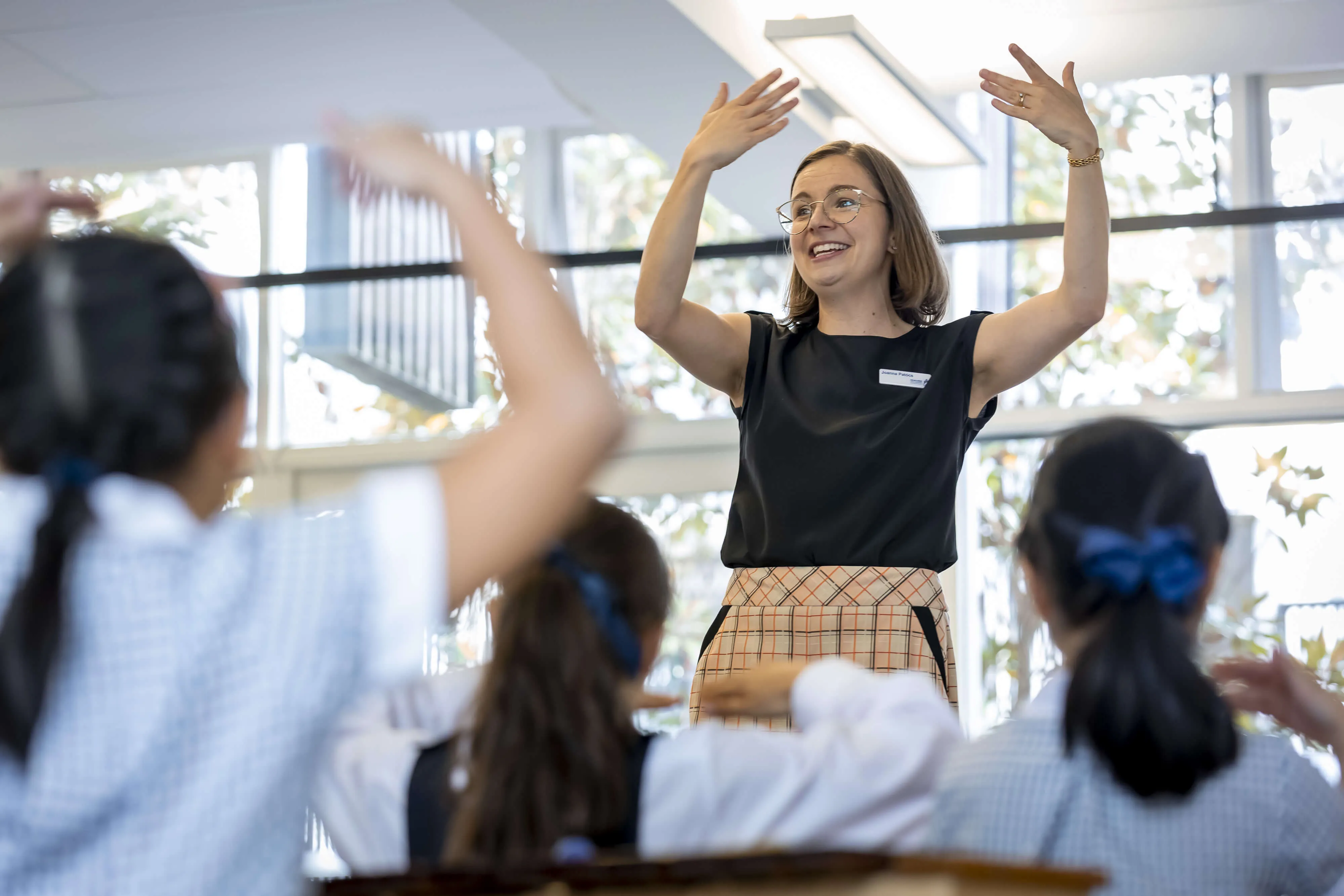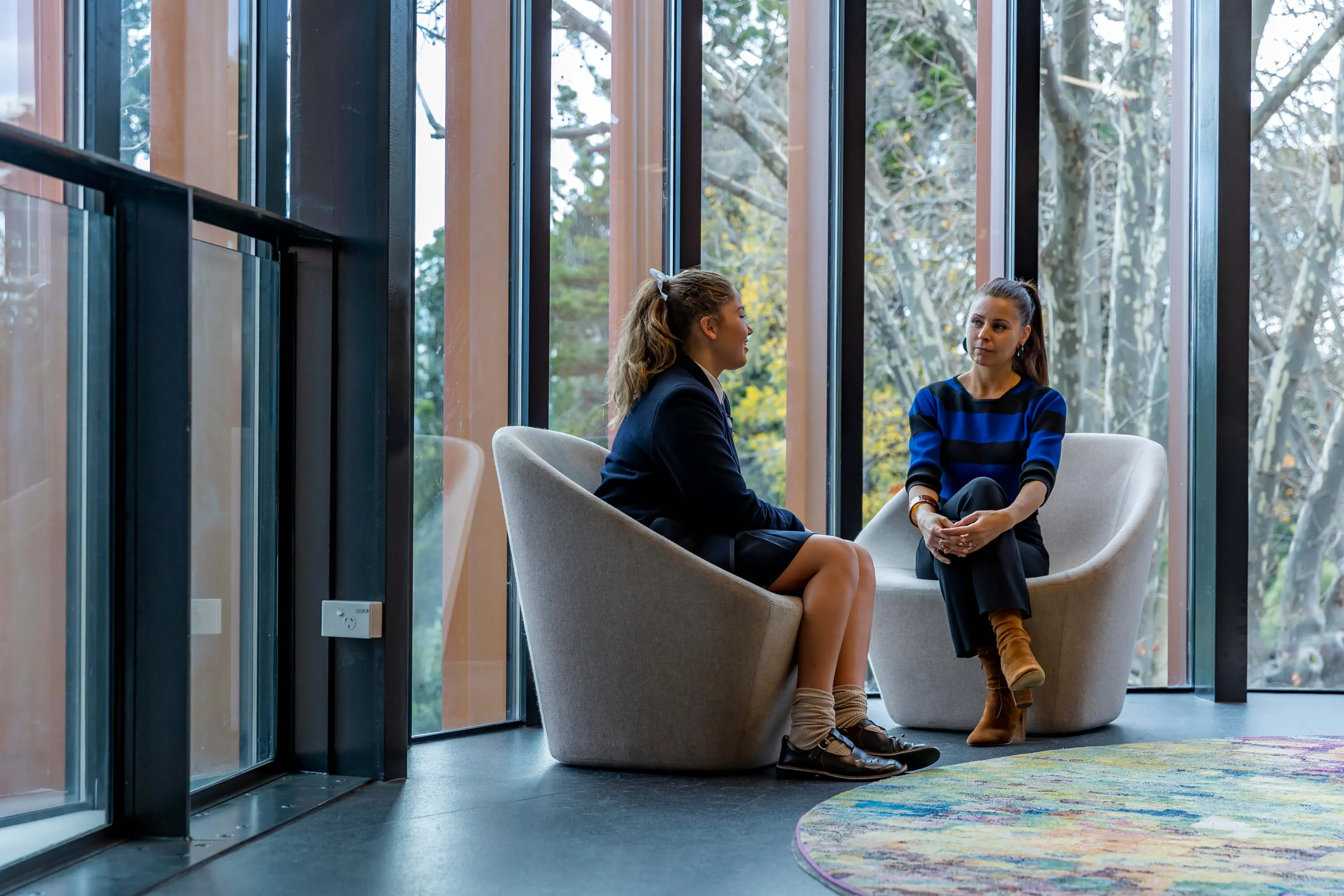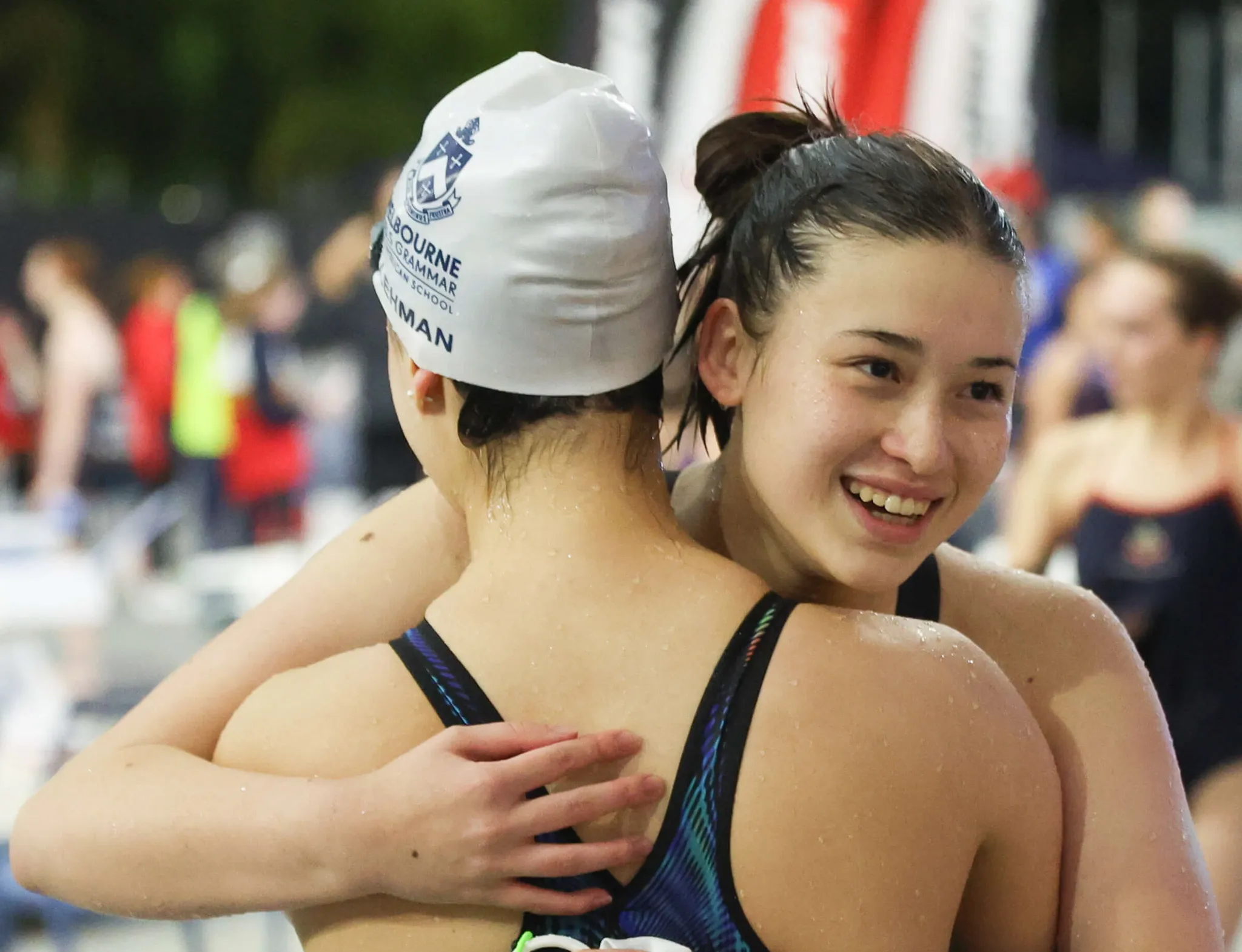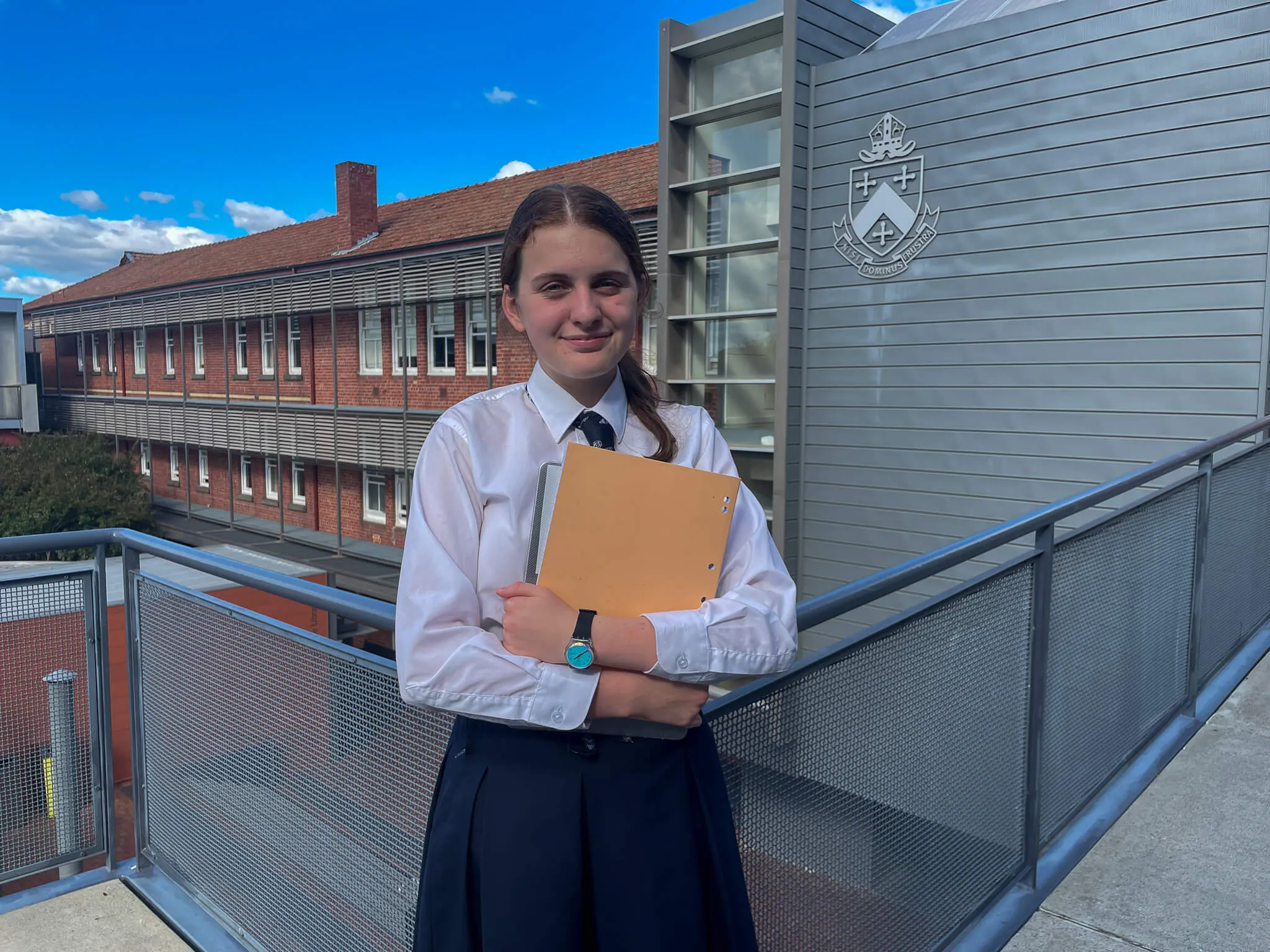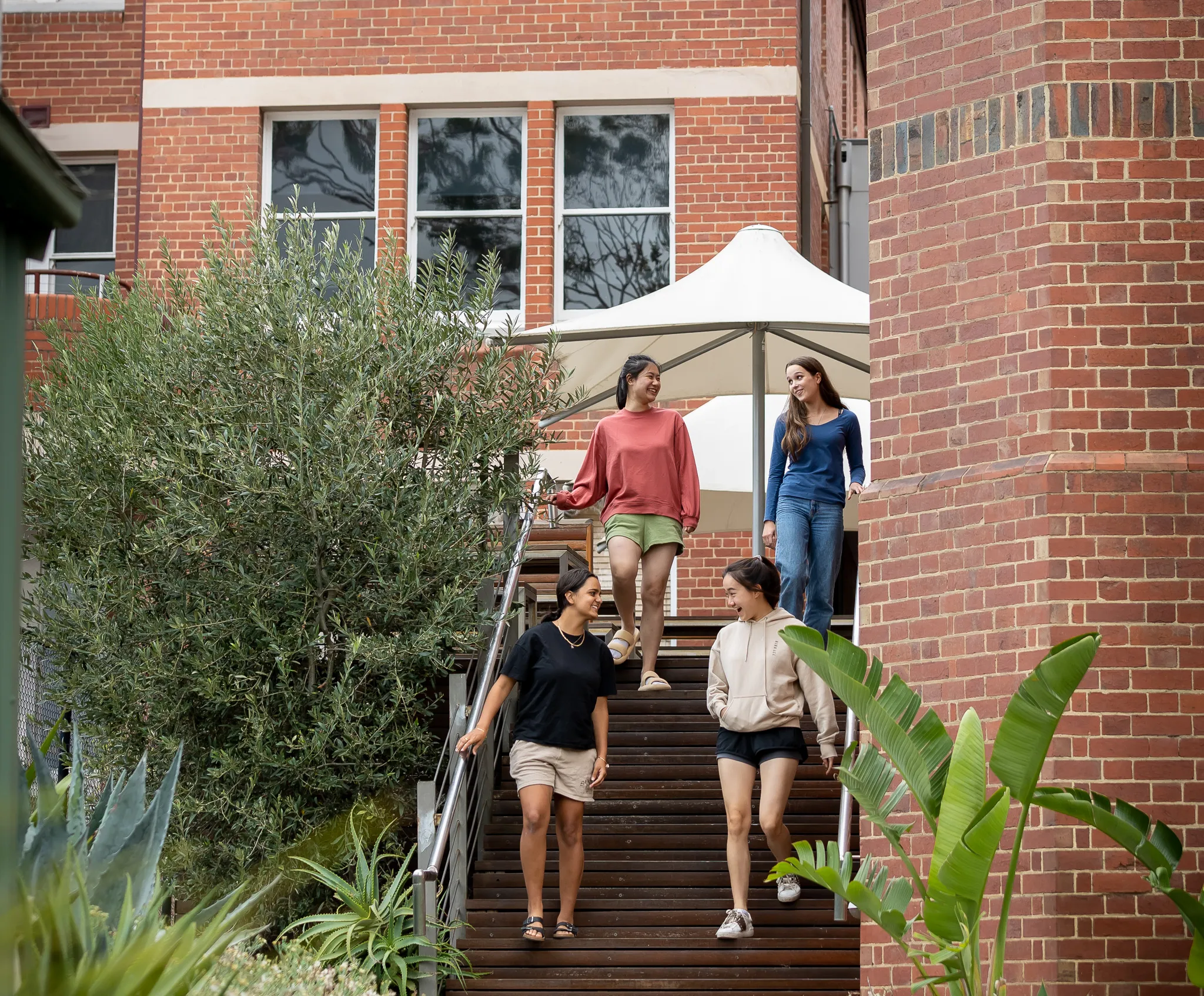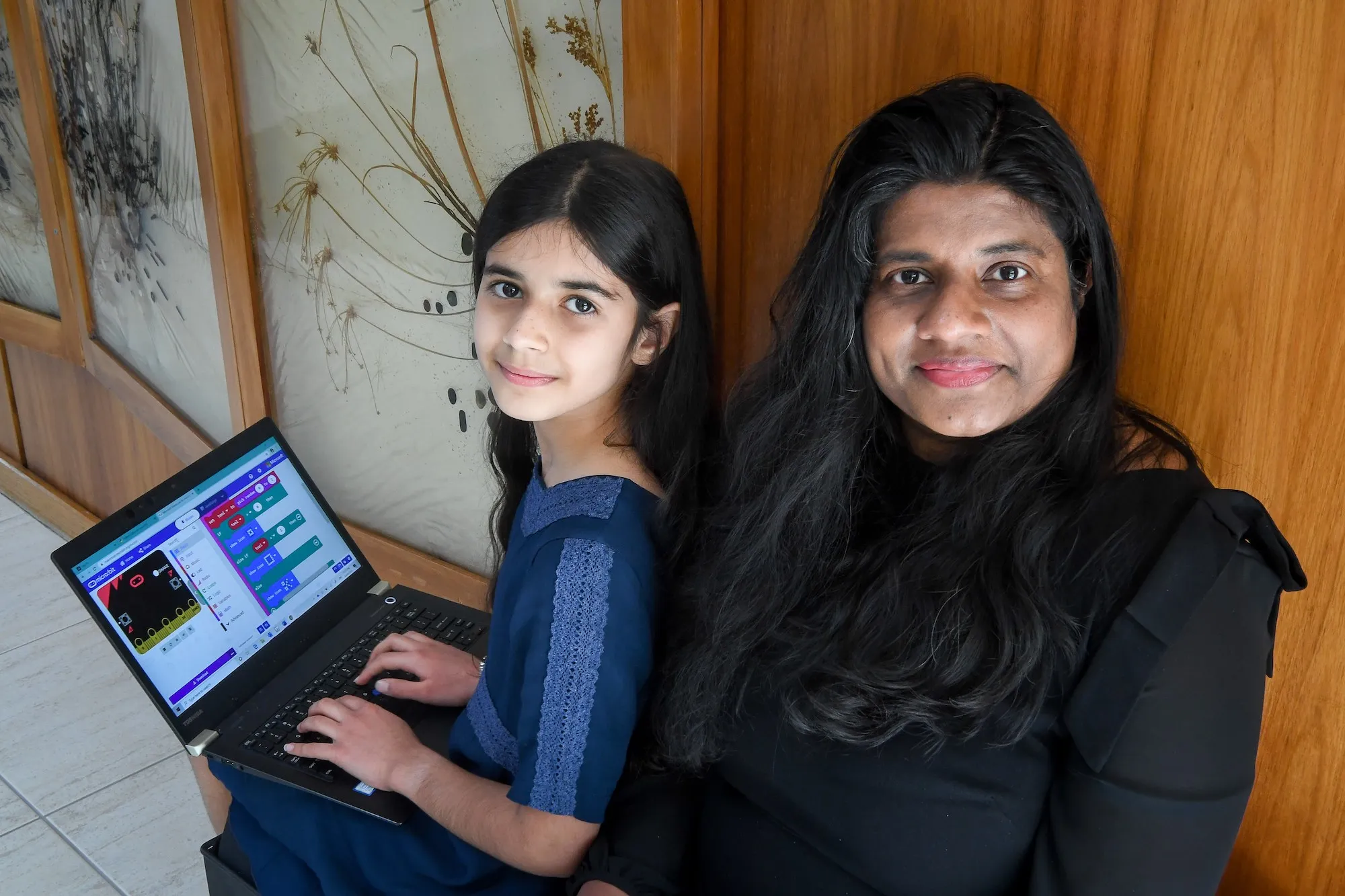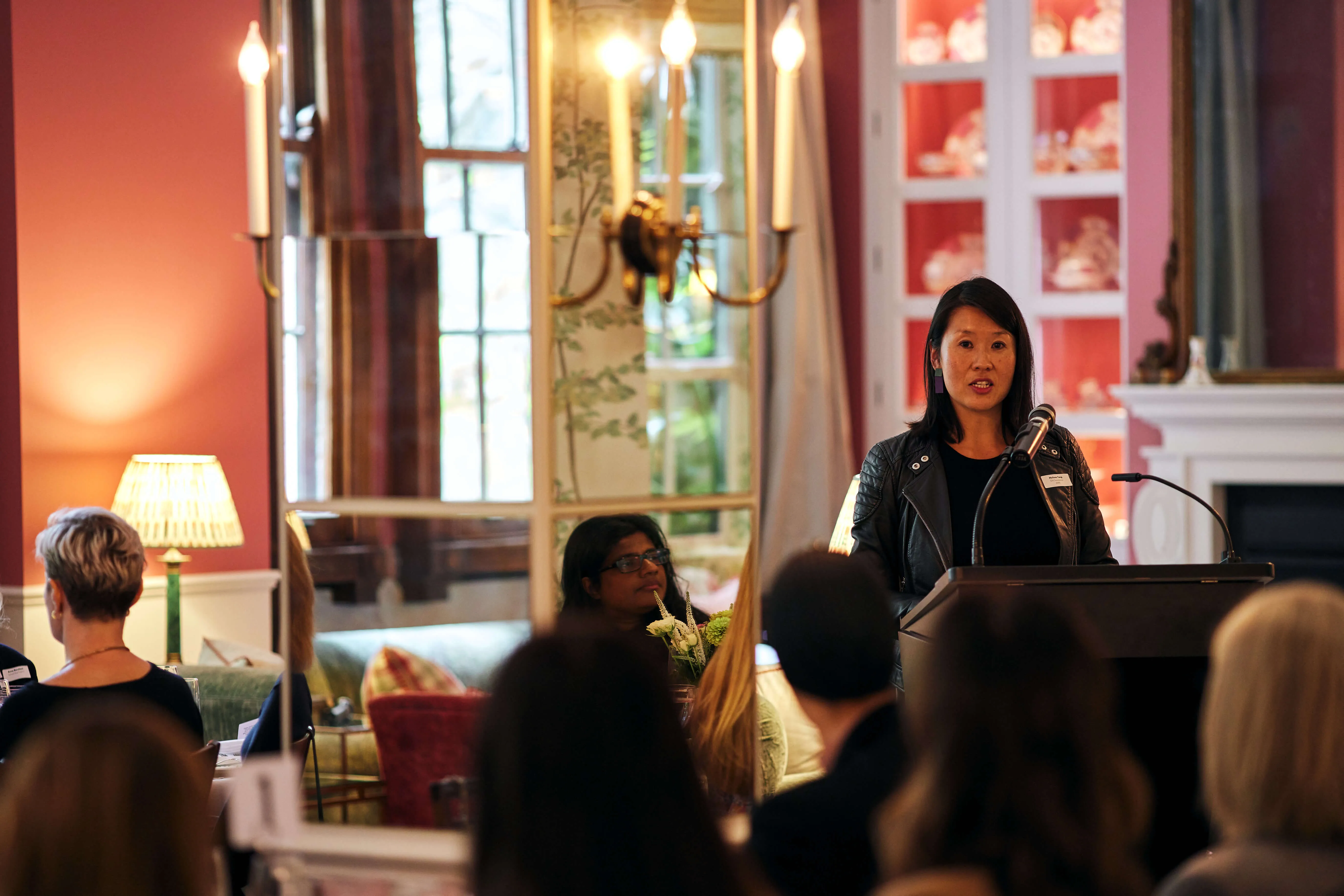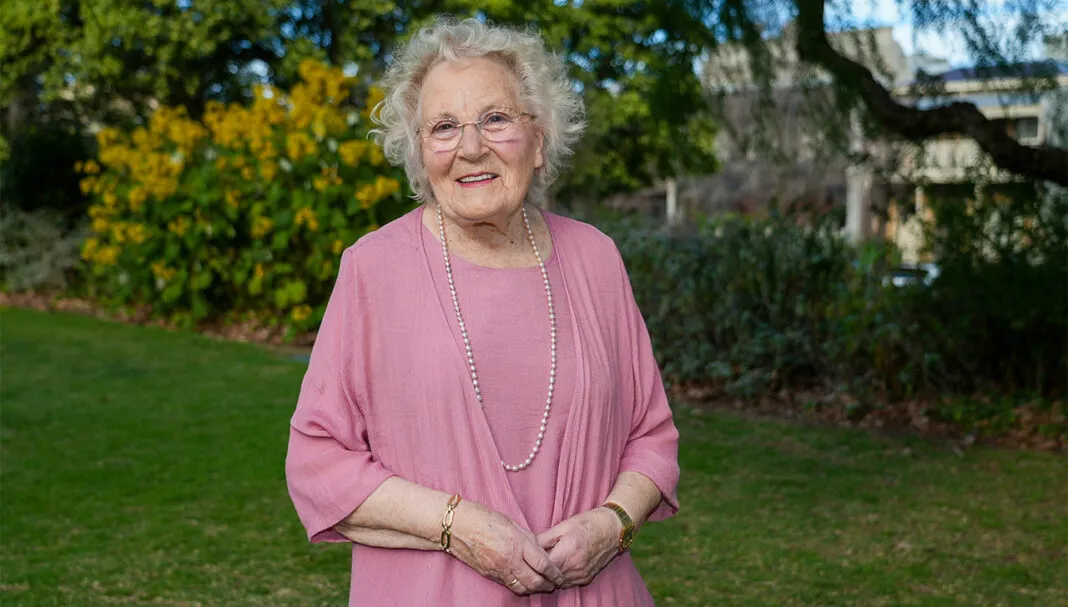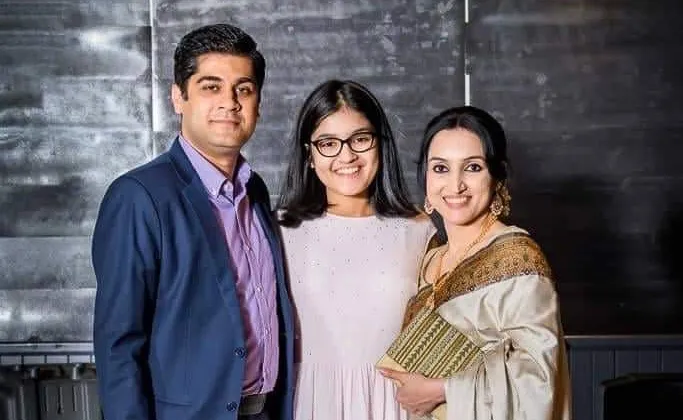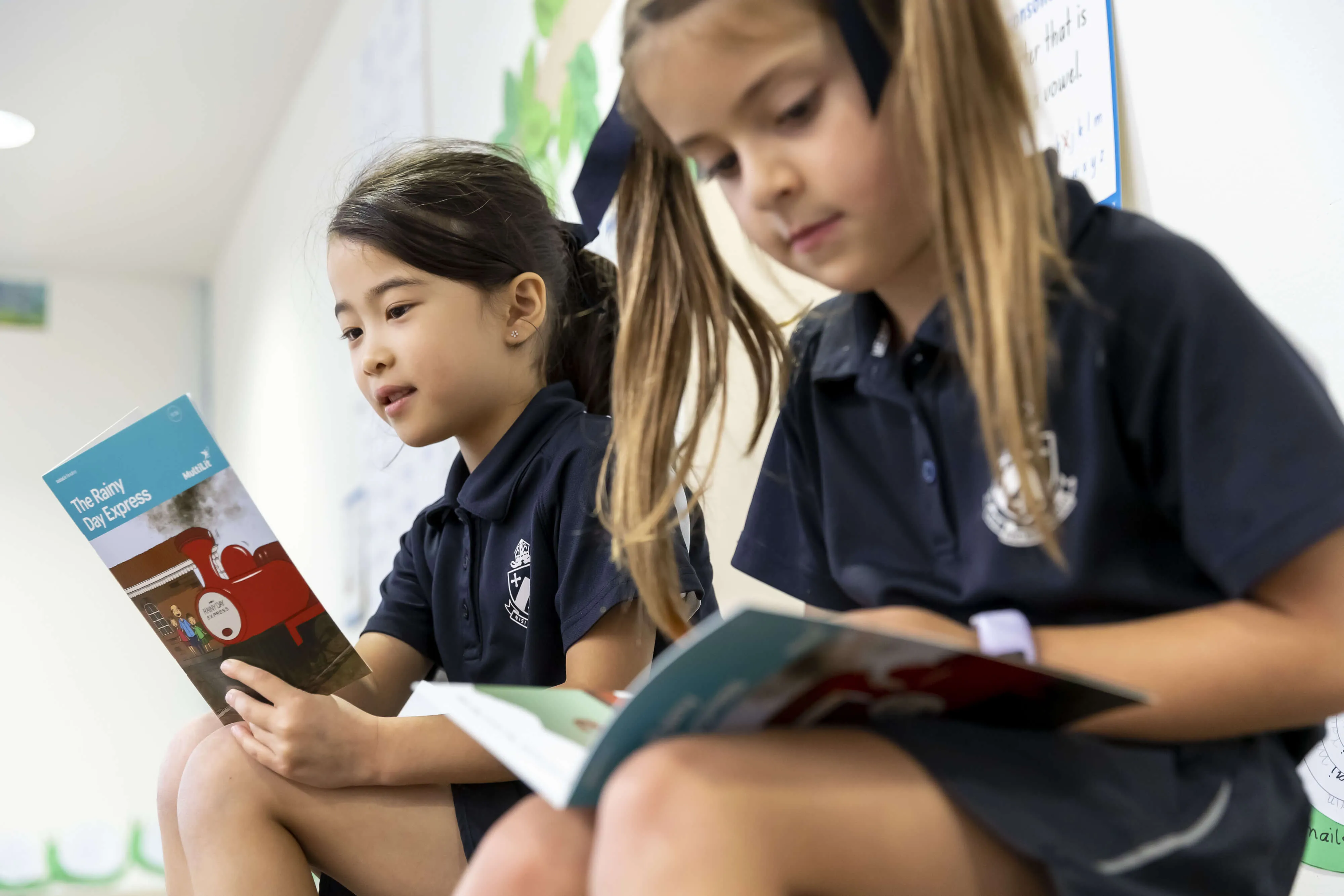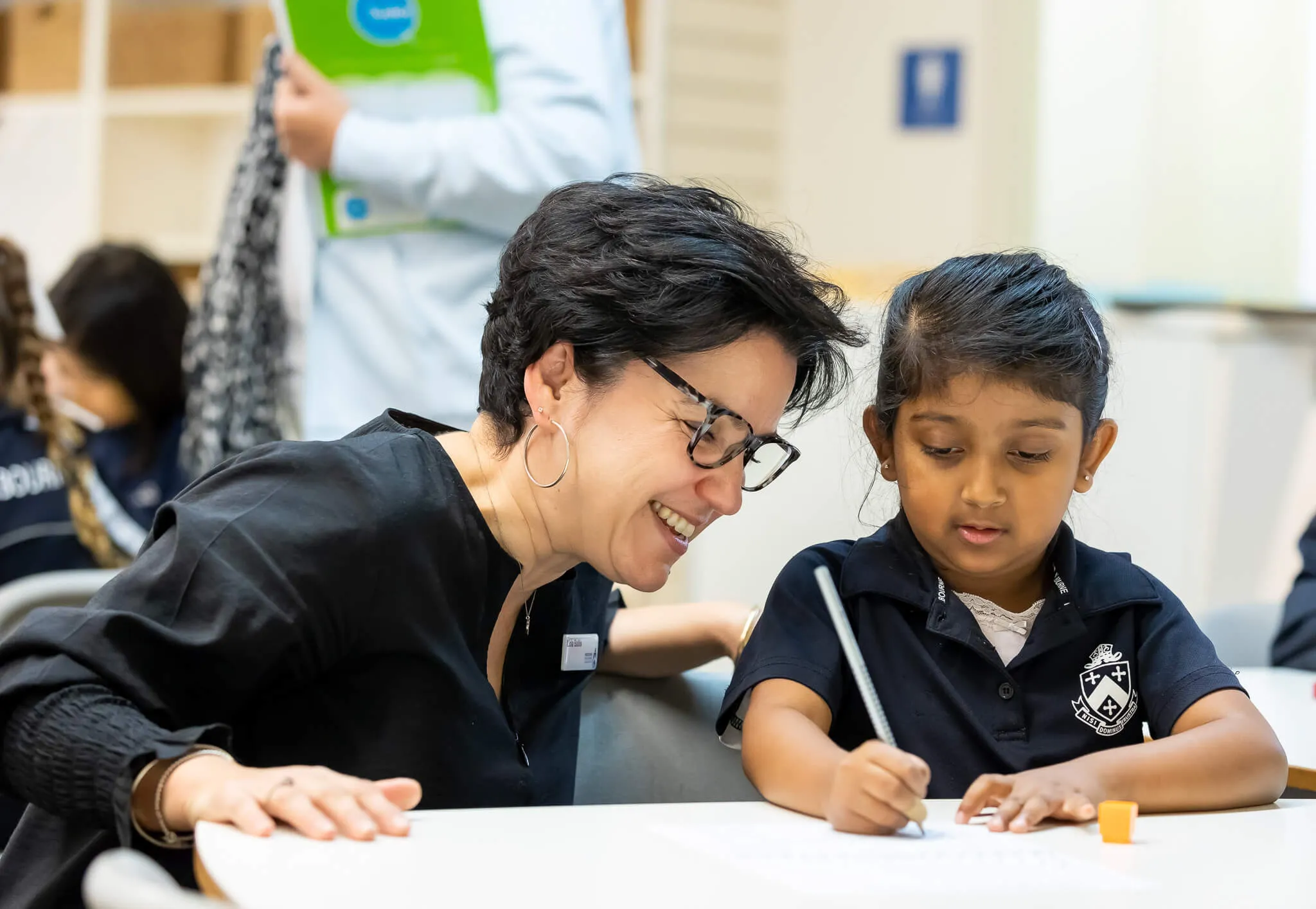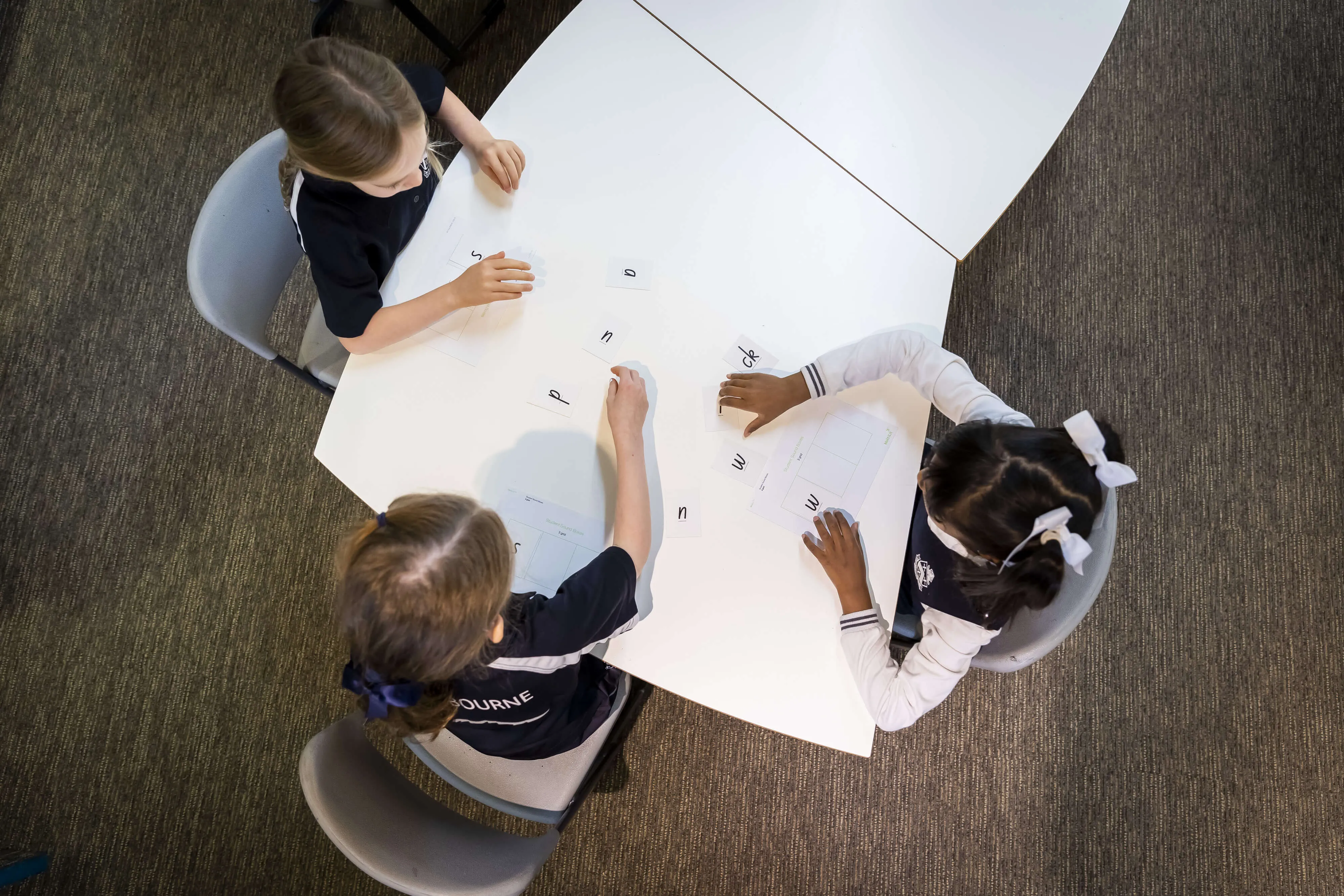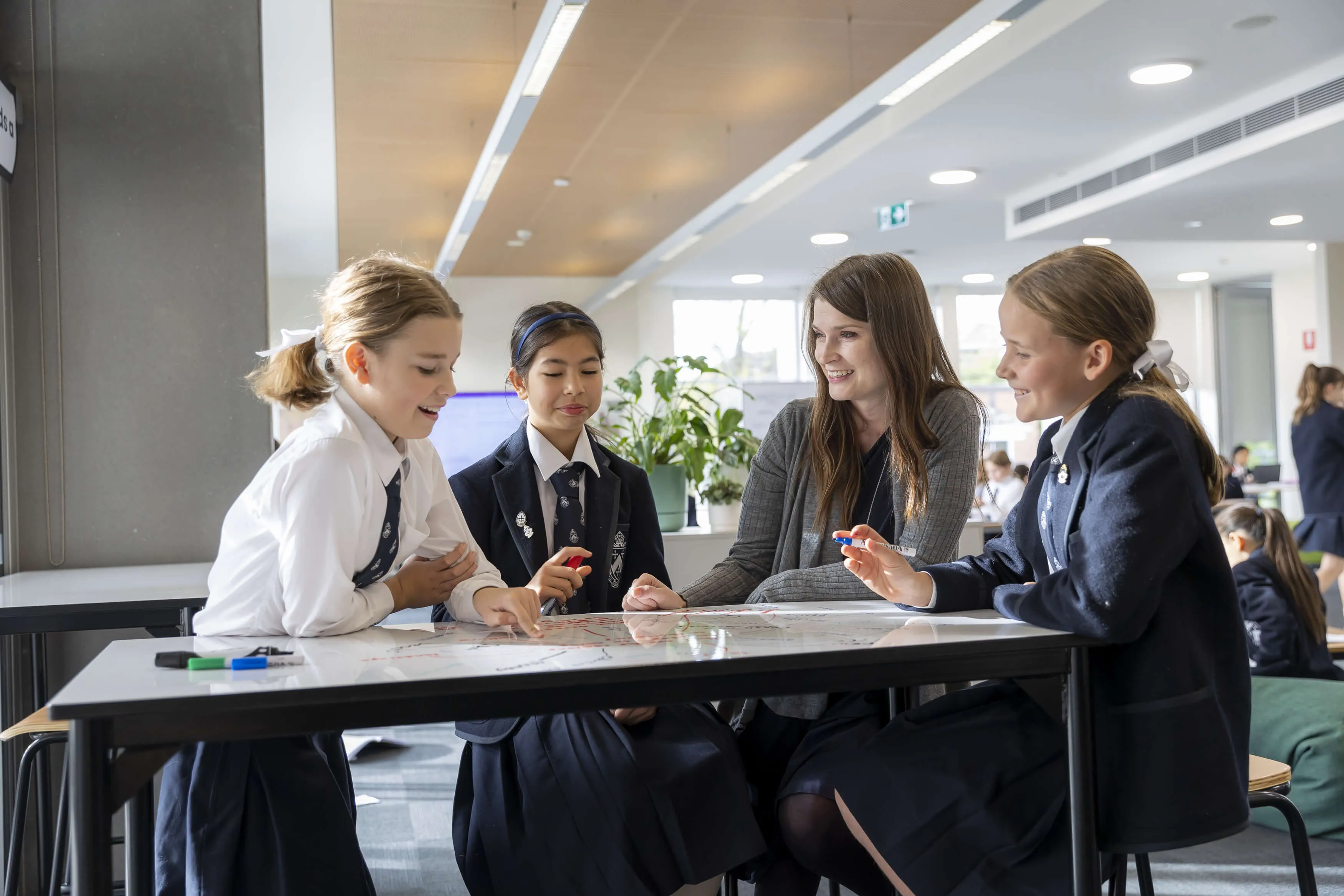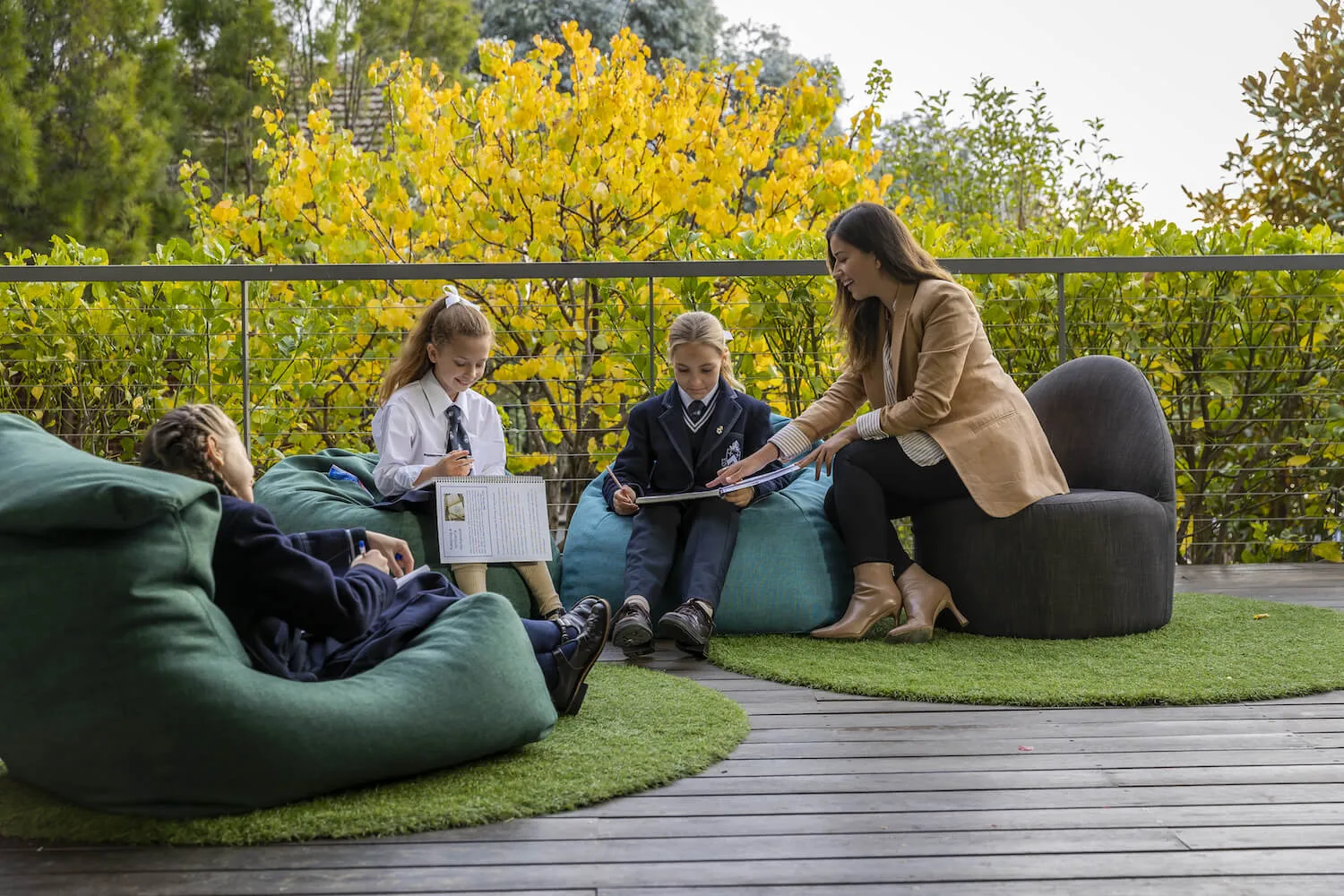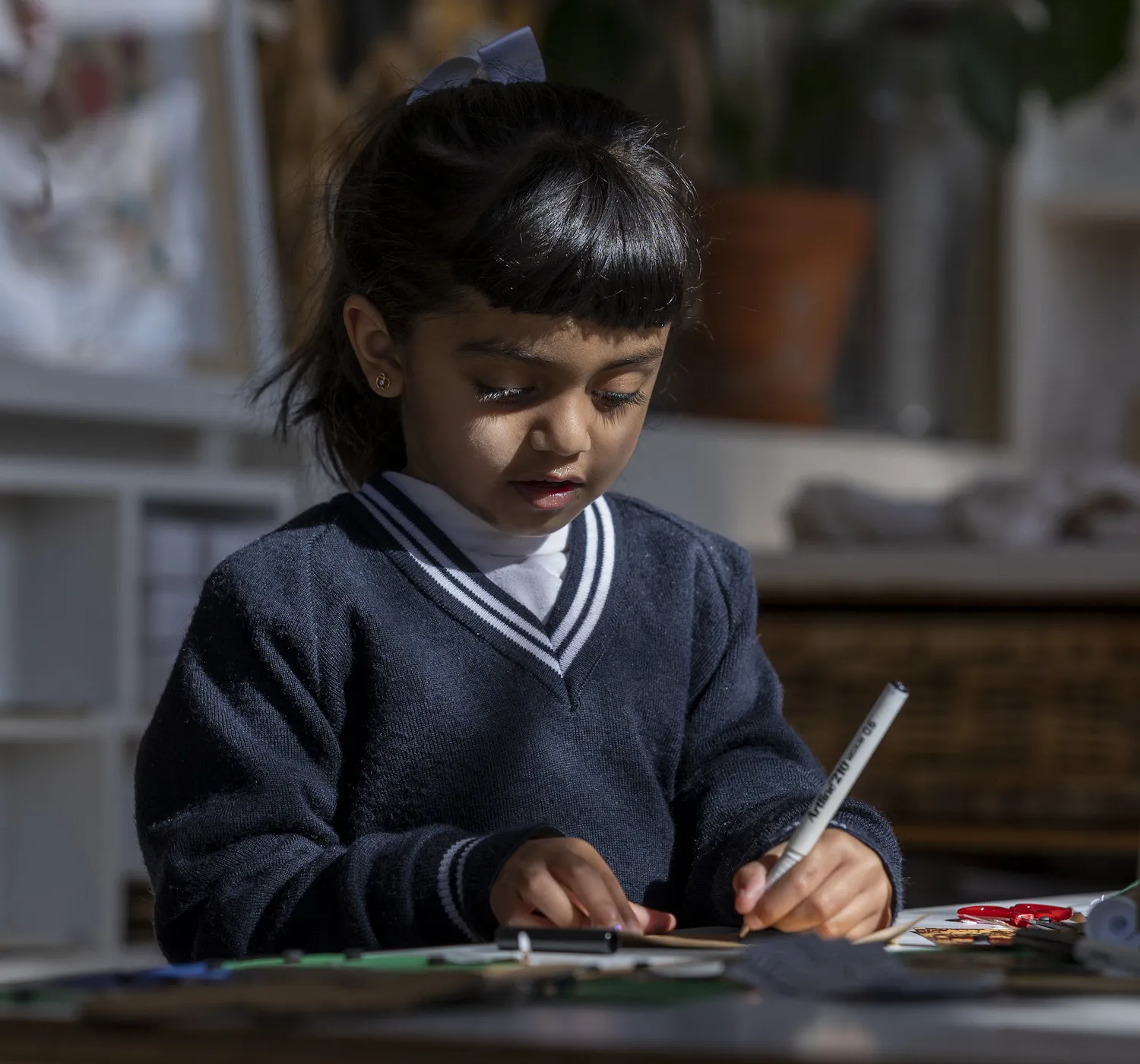

Zivah, Prep, writes down her name. Name writing is a key literacy skill our youngest Grammarians learn.


Zivah, Prep, writes down her name. Name writing is a key literacy skill our youngest Grammarians learn.
Unlocking a World Full of Learning
Literacy is a vital part of our lives and our learning no matter our age. Being literate increases opportunities in all aspects of our lives and lays the foundation for lifelong learning. Literacy unlocks a wider range of learning opportunities and plays a fundamental part in all learning.

Being capable of reading and writing allows us to communicate effectively and understand our world; it sets us up with the best chance to succeed in learning and in everyday life. Literacy plays a key role in transforming our Grammarians into socially-engaged students, empowered with skills for life.
From our ELC to Year 12, we develop our Grammarians' literacy skills. From ELC and the Junior Years, our Grammarians develop foundations in literacy. They set the benchmark for future academic extension, defining linguistic and phonetic understanding and ignite the imagination through storytelling, bringing characters, places and experiences to life. They inspire and define the power of the narrative from an early age.
ELC Teacher Nicole Stynes says our program, which is influenced heavily by the Reggio Emilia approach, addresses all areas of our youngest Grammarians’ literacy development through fun, play-based scenarios. “We understand that good literacy programs begin long before children enter into the reading programs taught in primary school and particularly in our Junior Years program at Morris Hall.” She adds that play-based experiences allow our Grammarians to engage in a wide range of pre-literacy learning opportunities. Our play areas are equipped with items, like a pen and clipboard or a basic recipe book, which encourages role play, and basic reading and writing. Drawing allows our girls to put their observations, thoughts and reflections in a physical form.
Being capable of reading and writing allows us to communicate effectively and understand our world; it sets us up with the best chance to succeed in learning and in everyday life. Literacy plays a key role in transforming our Grammarians into socially-engaged students, empowered with skills for life.
From our ELC to Year 12, we develop our Grammarians' literacy skills. From ELC and the Junior Years, our Grammarians develop foundations in literacy. They set the benchmark for future academic extension, defining linguistic and phonetic understanding and ignite the imagination through storytelling, bringing characters, places and experiences to life. They inspire and define the power of the narrative from an early age.
ELC Teacher Nicole Stynes says our program, which is influenced heavily by the Reggio Emilia approach, addresses all areas of our youngest Grammarians’ literacy development through fun, play-based scenarios. “We understand that good literacy programs begin long before children enter into the reading programs taught in primary school and particularly in our Junior Years program at Morris Hall.” She adds that play-based experiences allow our Grammarians to engage in a wide range of pre-literacy learning opportunities. Our play areas are equipped with items, like a pen and clipboard or a basic recipe book, which encourages role play, and basic reading and writing. Drawing allows our girls to put their observations, thoughts and reflections in a physical form.
Being capable of reading and writing allows us to communicate effectively and understand our world; it sets us up with the best chance to succeed in learning and in everyday life. Literacy plays a key role in transforming our Grammarians into socially-engaged students, empowered with skills for life.
From our ELC to Year 12, we develop our Grammarians' literacy skills. From ELC and the Junior Years, our Grammarians develop foundations in literacy. They set the benchmark for future academic extension, defining linguistic and phonetic understanding and ignite the imagination through storytelling, bringing characters, places and experiences to life. They inspire and define the power of the narrative from an early age.
ELC Teacher Nicole Stynes says our program, which is influenced heavily by the Reggio Emilia approach, addresses all areas of our youngest Grammarians’ literacy development through fun, play-based scenarios. “We understand that good literacy programs begin long before children enter into the reading programs taught in primary school and particularly in our Junior Years program at Morris Hall.” She adds that play-based experiences allow our Grammarians to engage in a wide range of pre-literacy learning opportunities. Our play areas are equipped with items, like a pen and clipboard or a basic recipe book, which encourages role play, and basic reading and writing. Drawing allows our girls to put their observations, thoughts and reflections in a physical form.

“We understand that when a child draws, they are recording a message for others to observe and make meaning of — a fundamental pre-literacy skill.”
ELC Teacher Nicole Stynes
“We understand that when a child draws, they are recording a message for others to observe and make meaning of — a fundamental pre-literacy skill.”
ELC Teacher Nicole Stynes
“We understand that when a child draws, they are recording a message for others to observe and make meaning of — a fundamental pre-literacy skill.”
ELC Teacher Nicole Stynes

Daily group conversations, name and journal writing, rhymes, songs, simple hand-focused games, and word prompts also play major roles in building the base of our ELC students’ literacy skills. Nicole says the important skills our Grammarians learn in this stage of their schooling give them the confidence to embrace the new learning opportunities they will face in the coming years.
Our Junior Years program then takes the baton with the key goal of creating successful young learners. The rich oral development in the ELC is critical to preparing these Grammarians for when they transition to Morris Hall. Deputy Director, Junior Years, Claire Stubbings says literacy in the Junior Years program centres around setting up our Grammarians with the foundational skills that will stick with them throughout their journey at MGGS. “If we are successful in our literacy teaching, then we're producing highly literate students with a strong vocabulary and the literacy skills that they need to study more complex topics or take their learning further in Middle and Senior Years.”
A Structured Synthetic Phonics (SSP) approach to teaching literacy has been used for several years at Morris Hall to form the early skill base of our Prep to Year 2s. SSP is a fundamental step in learning how to read, spell and then write. The evidence-based approach is about learning the codes of the English language, linking sounds that our Grammarians hear into encoding for spelling or decoding for reading. Claire says because literacy is the foundation for all later learning and learning success, it is essential to get the fundamental skills right. “If the girls don't have those fundamental skills in the early years, it becomes a bit more challenging in their later years to master literacy.”
Chris Hogan, Deputy Director, Learning Enhancement and Support P-6, says the SSP approach doesn't disappear in Years 3 and 4 but shifts slightly from learning to read into reading to learn. By the end of Year 2, Grammarians have mastered the initial stages of reading and spelling and can apply their skills. Our Grammarians can begin learning more complex texts, vocabulary, and spelling patterns with these skills. Direct instruction — another evidence-based approach — is also used to teach our students during this stage. Chris says the students are still grouped but instructed at their points of need. There is also a focus on morphology, using prefixes and suffixes to help them understand the meaning of words and build comprehension. The Morris Hall Library and other cross-curricular programs, such as Three and Four Speaks, teach students research and public speaking skills, which are also important in their literacy and wider education.
Daily group conversations, name and journal writing, rhymes, songs, simple hand-focused games, and word prompts also play major roles in building the base of our ELC students’ literacy skills. Nicole says the important skills our Grammarians learn in this stage of their schooling give them the confidence to embrace the new learning opportunities they will face in the coming years.
Our Junior Years program then takes the baton with the key goal of creating successful young learners. The rich oral development in the ELC is critical to preparing these Grammarians for when they transition to Morris Hall. Deputy Director, Junior Years, Claire Stubbings says literacy in the Junior Years program centres around setting up our Grammarians with the foundational skills that will stick with them throughout their journey at MGGS. “If we are successful in our literacy teaching, then we're producing highly literate students with a strong vocabulary and the literacy skills that they need to study more complex topics or take their learning further in Middle and Senior Years.”
A Structured Synthetic Phonics (SSP) approach to teaching literacy has been used for several years at Morris Hall to form the early skill base of our Prep to Year 2s. SSP is a fundamental step in learning how to read, spell and then write. The evidence-based approach is about learning the codes of the English language, linking sounds that our Grammarians hear into encoding for spelling or decoding for reading. Claire says because literacy is the foundation for all later learning and learning success, it is essential to get the fundamental skills right. “If the girls don't have those fundamental skills in the early years, it becomes a bit more challenging in their later years to master literacy.”
Chris Hogan, Deputy Director, Learning Enhancement and Support P-6, says the SSP approach doesn't disappear in Years 3 and 4 but shifts slightly from learning to read into reading to learn. By the end of Year 2, Grammarians have mastered the initial stages of reading and spelling and can apply their skills. Our Grammarians can begin learning more complex texts, vocabulary, and spelling patterns with these skills. Direct instruction — another evidence-based approach — is also used to teach our students during this stage. Chris says the students are still grouped but instructed at their points of need. There is also a focus on morphology, using prefixes and suffixes to help them understand the meaning of words and build comprehension. The Morris Hall Library and other cross-curricular programs, such as Three and Four Speaks, teach students research and public speaking skills, which are also important in their literacy and wider education.
Daily group conversations, name and journal writing, rhymes, songs, simple hand-focused games, and word prompts also play major roles in building the base of our ELC students’ literacy skills. Nicole says the important skills our Grammarians learn in this stage of their schooling give them the confidence to embrace the new learning opportunities they will face in the coming years.
Our Junior Years program then takes the baton with the key goal of creating successful young learners. The rich oral development in the ELC is critical to preparing these Grammarians for when they transition to Morris Hall. Deputy Director, Junior Years, Claire Stubbings says literacy in the Junior Years program centres around setting up our Grammarians with the foundational skills that will stick with them throughout their journey at MGGS. “If we are successful in our literacy teaching, then we're producing highly literate students with a strong vocabulary and the literacy skills that they need to study more complex topics or take their learning further in Middle and Senior Years.”
A Structured Synthetic Phonics (SSP) approach to teaching literacy has been used for several years at Morris Hall to form the early skill base of our Prep to Year 2s. SSP is a fundamental step in learning how to read, spell and then write. The evidence-based approach is about learning the codes of the English language, linking sounds that our Grammarians hear into encoding for spelling or decoding for reading. Claire says because literacy is the foundation for all later learning and learning success, it is essential to get the fundamental skills right. “If the girls don't have those fundamental skills in the early years, it becomes a bit more challenging in their later years to master literacy.”
Chris Hogan, Deputy Director, Learning Enhancement and Support P-6, says the SSP approach doesn't disappear in Years 3 and 4 but shifts slightly from learning to read into reading to learn. By the end of Year 2, Grammarians have mastered the initial stages of reading and spelling and can apply their skills. Our Grammarians can begin learning more complex texts, vocabulary, and spelling patterns with these skills. Direct instruction — another evidence-based approach — is also used to teach our students during this stage. Chris says the students are still grouped but instructed at their points of need. There is also a focus on morphology, using prefixes and suffixes to help them understand the meaning of words and build comprehension. The Morris Hall Library and other cross-curricular programs, such as Three and Four Speaks, teach students research and public speaking skills, which are also important in their literacy and wider education.

Despite the different approaches used in the year levels at Morris Hall, using a common language ensures the transition is smooth and seamless. Claire says, “the girls need to approach spelling and reading by hearing the same prompts and strategies from teachers. That's important when they move across to Wildfell (Years 5 and 6), so we're not teaching discrete skills that might translate but teaching ones that will.” She adds the common language comes back to the idea of the Morris Hall program being the foundational years in our Grammarians mastering literacy skills. “Then we can send students up to Wildfell and beyond with secure reading, spelling and writing skills. They are ready to take that reading to learn even further by starting to express themselves in complex ways and understanding complex ideas in dense texts.” The literacy skills allow them to go into broader programs at Merton Hall, as they need to be literate to engage in subjects like Science, Mathematics and Humanities.
The momentum created in the early stages of our Grammarians' education continues through the Middle Years program by focusing on extending their skills further. In Years 5 and 6, Grammarians are encouraged to build a deeper understanding of texts while enjoying, creating, and developing the tools needed to critique texts in various forms. A key focus during this stage is the comprehensive and sophisticated development of their writing skills. Students are taught language and spelling conventions, which are integrated into reading and writing experiences.
Years 7 and 8 students expand the range and complexity of the texts they create and respond to. During this stage, they build a strong foundation of language awareness and literacy skills that will underpin their success in the Senior Years program.
The skills built up through each level culminate in the Senior Years program. Here, students tackle their learning and the next level of challenge. Years 9 and 10, and VCE with confidence. Years 9 and 10 Grammarians apply their literacy skills in elective courses, that provides opportunity to explore a range of literacy, linguistic and communication forms that lead to them making informed decisions with their VCE course choices. It creates context and relevance, allowing each Grammarian to select study units they are passionate about and will help them achieve. In our Senior Years program, our Grammarians are encouraged to use their literacy skills to read, think, and write critically, accurately and concisely. Executive Director, Senior Years, and teacher of English Language Luke Francis says the English electives are wonderful for empowering Grammarians with choice and gives them a taste of VCE English subjects whilst still ensuring they complete a rigorous curriculum. The electives allow Grammarians to define their literacy path with confidence.
Despite the different approaches used in the year levels at Morris Hall, using a common language ensures the transition is smooth and seamless. Claire says, “the girls need to approach spelling and reading by hearing the same prompts and strategies from teachers. That's important when they move across to Wildfell (Years 5 and 6), so we're not teaching discrete skills that might translate but teaching ones that will.” She adds the common language comes back to the idea of the Morris Hall program being the foundational years in our Grammarians mastering literacy skills. “Then we can send students up to Wildfell and beyond with secure reading, spelling and writing skills. They are ready to take that reading to learn even further by starting to express themselves in complex ways and understanding complex ideas in dense texts.” The literacy skills allow them to go into broader programs at Merton Hall, as they need to be literate to engage in subjects like Science, Mathematics and Humanities.
The momentum created in the early stages of our Grammarians' education continues through the Middle Years program by focusing on extending their skills further. In Years 5 and 6, Grammarians are encouraged to build a deeper understanding of texts while enjoying, creating, and developing the tools needed to critique texts in various forms. A key focus during this stage is the comprehensive and sophisticated development of their writing skills. Students are taught language and spelling conventions, which are integrated into reading and writing experiences.
Years 7 and 8 students expand the range and complexity of the texts they create and respond to. During this stage, they build a strong foundation of language awareness and literacy skills that will underpin their success in the Senior Years program.
The skills built up through each level culminate in the Senior Years program. Here, students tackle their learning and the next level of challenge. Years 9 and 10, and VCE with confidence. Years 9 and 10 Grammarians apply their literacy skills in elective courses, that provides opportunity to explore a range of literacy, linguistic and communication forms that lead to them making informed decisions with their VCE course choices. It creates context and relevance, allowing each Grammarian to select study units they are passionate about and will help them achieve. In our Senior Years program, our Grammarians are encouraged to use their literacy skills to read, think, and write critically, accurately and concisely. Executive Director, Senior Years, and teacher of English Language Luke Francis says the English electives are wonderful for empowering Grammarians with choice and gives them a taste of VCE English subjects whilst still ensuring they complete a rigorous curriculum. The electives allow Grammarians to define their literacy path with confidence.



In Year 9, students can pick two of the three English electives — Political Art (Communication/PR), Stories We Tell (Journalism), and Days of Future Past (Science Fiction). Students learn about a variety of texts whilst building upon their strong foundational skills.
In Year 10, it expands to five choices — English in Society, Literature, Contemporary English, Making Connections and EAL. During this year, students get a taste of what VCE English is like whilst working through the different approaches to text analysis and building an awareness of language use in contemporary Australia. Head of English Yvette Arnott says the aim of the electives is “to tap into individual passions and broaden horizons with a more flexible curriculum.”
In the VCE, students either move into mainstream English, Literature, English Language or English as an Additional Language. Luke says, “the range of VCE subjects we offer is important for setting our students up for future learning – whether it be through tertiary study, which is the norm for our Grammarians, or in workplaces and for personal investigations.” He adds that literacy is the strongest indicator of future academic success, with the VCE subjects being a celebration of the hard work they have put into their English studies over many years. He says, “this stretches them to consider new perspectives and read deeply to find joy in the rigour and build confidence to establish, share, and challenge text interpretations.” Yvette says there is so much scope for teachers to be creative and instil fun in their teaching, whether it be reshaping the environment of the classroom or venturing out to the Royal Botanical Gardens or art galleries. She adds the classes can either be noisy or contemplatively quiet as students develop the essential skills of communication. Yvette says, “English classrooms have always been a place where we can read, perform, debate and explore ideas. This gives our teachers opportunities to continually reshape the environment of the classroom.”
In Year 9, students can pick two of the three English electives — Political Art (Communication/PR), Stories We Tell (Journalism), and Days of Future Past (Science Fiction). Students learn about a variety of texts whilst building upon their strong foundational skills.
In Year 10, it expands to five choices — English in Society, Literature, Contemporary English, Making Connections and EAL. During this year, students get a taste of what VCE English is like whilst working through the different approaches to text analysis and building an awareness of language use in contemporary Australia. Head of English Yvette Arnott says the aim of the electives is “to tap into individual passions and broaden horizons with a more flexible curriculum.”
In the VCE, students either move into mainstream English, Literature, English Language or English as an Additional Language. Luke says, “the range of VCE subjects we offer is important for setting our students up for future learning – whether it be through tertiary study, which is the norm for our Grammarians, or in workplaces and for personal investigations.” He adds that literacy is the strongest indicator of future academic success, with the VCE subjects being a celebration of the hard work they have put into their English studies over many years. He says, “this stretches them to consider new perspectives and read deeply to find joy in the rigour and build confidence to establish, share, and challenge text interpretations.” Yvette says there is so much scope for teachers to be creative and instil fun in their teaching, whether it be reshaping the environment of the classroom or venturing out to the Royal Botanical Gardens or art galleries. She adds the classes can either be noisy or contemplatively quiet as students develop the essential skills of communication. Yvette says, “English classrooms have always been a place where we can read, perform, debate and explore ideas. This gives our teachers opportunities to continually reshape the environment of the classroom.”
In Year 9, students can pick two of the three English electives — Political Art (Communication/PR), Stories We Tell (Journalism), and Days of Future Past (Science Fiction). Students learn about a variety of texts whilst building upon their strong foundational skills.
In Year 10, it expands to five choices — English in Society, Literature, Contemporary English, Making Connections and EAL. During this year, students get a taste of what VCE English is like whilst working through the different approaches to text analysis and building an awareness of language use in contemporary Australia. Head of English Yvette Arnott says the aim of the electives is “to tap into individual passions and broaden horizons with a more flexible curriculum.”
In the VCE, students either move into mainstream English, Literature, English Language or English as an Additional Language. Luke says, “the range of VCE subjects we offer is important for setting our students up for future learning – whether it be through tertiary study, which is the norm for our Grammarians, or in workplaces and for personal investigations.” He adds that literacy is the strongest indicator of future academic success, with the VCE subjects being a celebration of the hard work they have put into their English studies over many years. He says, “this stretches them to consider new perspectives and read deeply to find joy in the rigour and build confidence to establish, share, and challenge text interpretations.” Yvette says there is so much scope for teachers to be creative and instil fun in their teaching, whether it be reshaping the environment of the classroom or venturing out to the Royal Botanical Gardens or art galleries. She adds the classes can either be noisy or contemplatively quiet as students develop the essential skills of communication. Yvette says, “English classrooms have always been a place where we can read, perform, debate and explore ideas. This gives our teachers opportunities to continually reshape the environment of the classroom.”
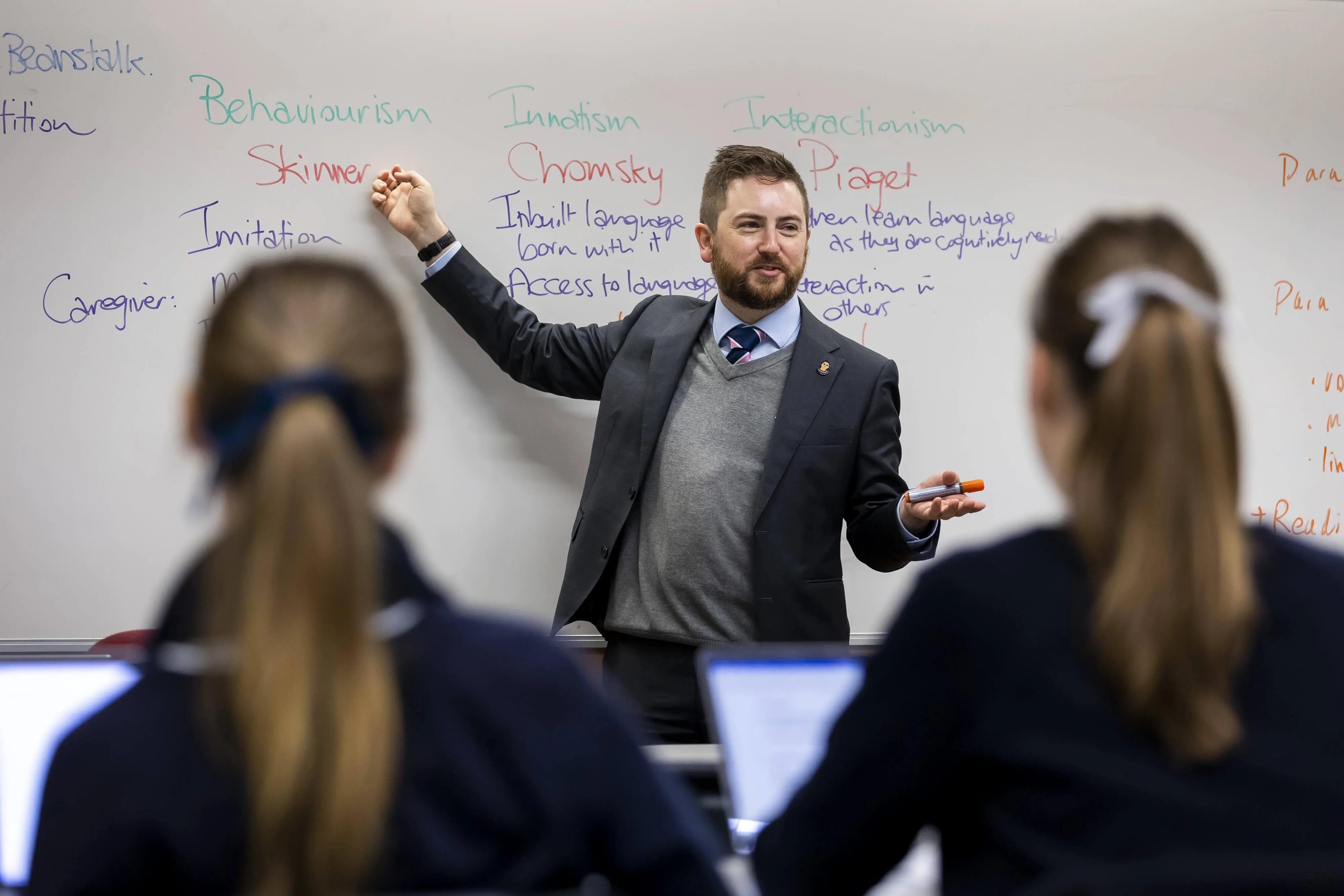




Senior Years Director Luke Francis says the English electives are wonderful for empowering Grammarians with choice and gives them a taste of VCE English subjects.
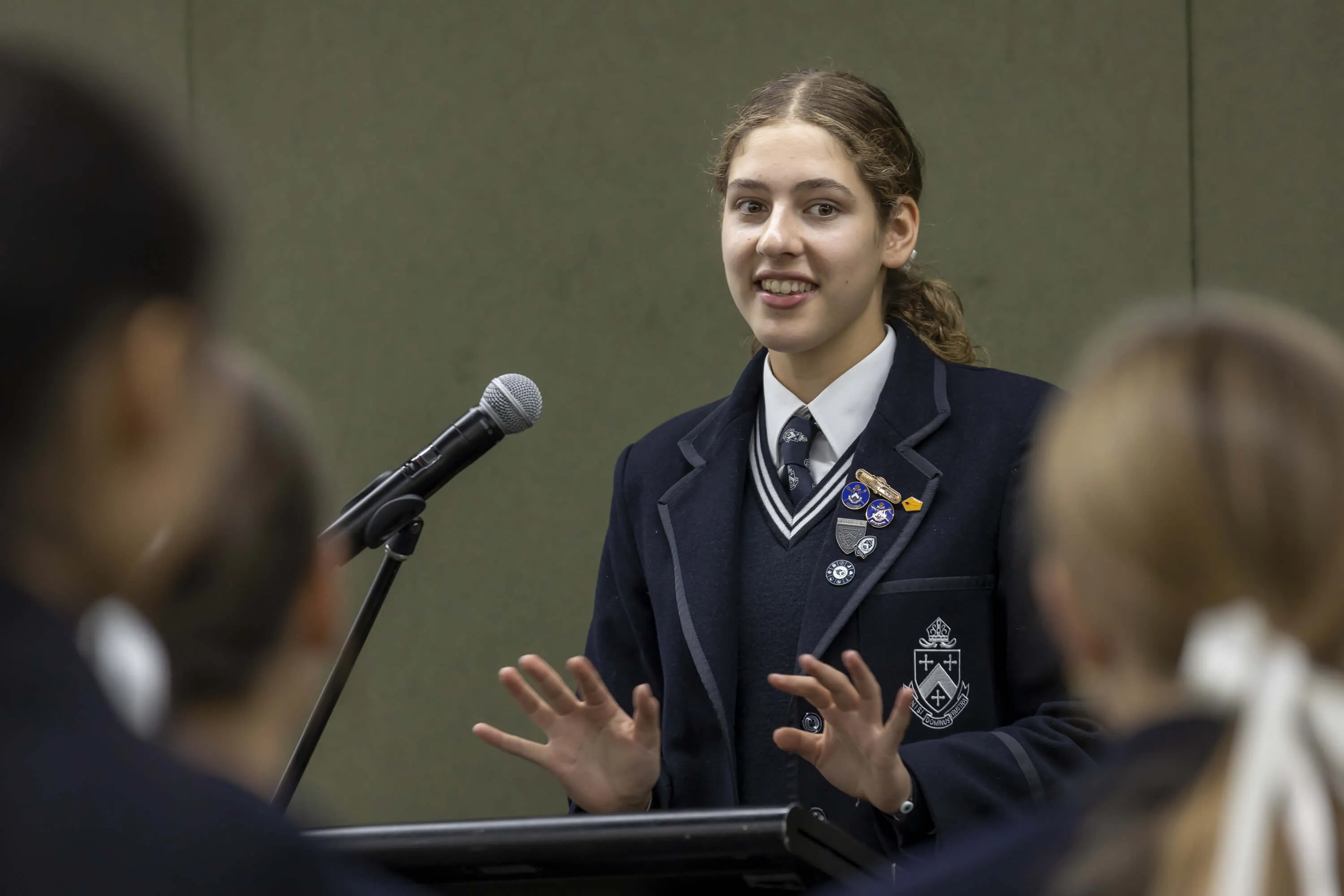

Year 11 student Bianca speaks in front of her peers. Our Grammarians build presenting skills of many forms at all stages of their literacy learning.


Senior Years Director Luke Francis says the English electives are wonderful for empowering Grammarians with choice and gives them a taste of VCE English subjects.


Year 11 student Bianca speaks in front of her peers. Our Grammarians build presenting skills of many forms at all stages of their literacy learning.
Students build reading, writing, researching and presenting skills in various ways in our Senior Years program. Students are encouraged to read widely and participate in extra-curricular activities like the Stella Society, and we encourage them to be avid readers as this builds their passion and proficiency. Students complete a range of writing tasks for feedback from their teachers, with scaffolded tasks and heavy drafting in the early stages, allowing students to more effectively establish their 'writing voice' and editing skills. Research is built into all elements of the work, with students learning how to research; these skills are then refined and reinforced over time. Students give oral presentations frequently in formal and informal contexts to support their ability to articulate ideas and provide evidence they are able to synthesise complex and challenging concepts.
The literacy skills our Grammarians develop are beneficial across many subjects in VCE; it underpins their ability to read, think and write critically across a range of specialist topics or impart knowledge, such as Humanities where complex concepts, perspectives and ideas are unpacked. Head of Humanities Roseanne Tiziani comments on how our Grammarians, “are asked to understand the information presented to them but to also think critically about the agendas or intent behind what they are reading. With this, we hope they become critical and active participants of the world around them.”
The literacy skills our Grammarians learn and strengthen during their time at MGGS are a life skills. They leave MGGS equipped with vital literacy skills that empower them as they explore the unknown world, and define their paths. Underpinning this learning are the passionate teachers who teach literacy skills that guide each student from the ELC through Morris Hall, Wildfell, St Hilda’s, Merton Hall and beyond. Luke says, “literacy is the strongest indicator of future academic success, so it is essential that we get this right to allow our students to be the best they can be, both in school and into the future. Students finding their passion for literacy and having the confidence to form and defend their ideas are essential skills for success in the VCE and beyond.”
Students build reading, writing, researching and presenting skills in various ways in our Senior Years program. Students are encouraged to read widely and participate in extra-curricular activities like the Stella Society, and we encourage them to be avid readers as this builds their passion and proficiency. Students complete a range of writing tasks for feedback from their teachers, with scaffolded tasks and heavy drafting in the early stages, allowing students to more effectively establish their 'writing voice' and editing skills. Research is built into all elements of the work, with students learning how to research; these skills are then refined and reinforced over time. Students give oral presentations frequently in formal and informal contexts to support their ability to articulate ideas and provide evidence they are able to synthesise complex and challenging concepts.
The literacy skills our Grammarians develop are beneficial across many subjects in VCE; it underpins their ability to read, think and write critically across a range of specialist topics or impart knowledge, such as Humanities where complex concepts, perspectives and ideas are unpacked. Head of Humanities Roseanne Tiziani comments on how our Grammarians, “are asked to understand the information presented to them but to also think critically about the agendas or intent behind what they are reading. With this, we hope they become critical and active participants of the world around them.”
The literacy skills our Grammarians learn and strengthen during their time at MGGS are a life skills. They leave MGGS equipped with vital literacy skills that empower them as they explore the unknown world, and define their paths. Underpinning this learning are the passionate teachers who teach literacy skills that guide each student from the ELC through Morris Hall, Wildfell, St Hilda’s, Merton Hall and beyond. Luke says, “literacy is the strongest indicator of future academic success, so it is essential that we get this right to allow our students to be the best they can be, both in school and into the future. Students finding their passion for literacy and having the confidence to form and defend their ideas are essential skills for success in the VCE and beyond.”
Students build reading, writing, researching and presenting skills in various ways in our Senior Years program. Students are encouraged to read widely and participate in extra-curricular activities like the Stella Society, and we encourage them to be avid readers as this builds their passion and proficiency. Students complete a range of writing tasks for feedback from their teachers, with scaffolded tasks and heavy drafting in the early stages, allowing students to more effectively establish their 'writing voice' and editing skills. Research is built into all elements of the work, with students learning how to research; these skills are then refined and reinforced over time. Students give oral presentations frequently in formal and informal contexts to support their ability to articulate ideas and provide evidence they are able to synthesise complex and challenging concepts.
The literacy skills our Grammarians develop are beneficial across many subjects in VCE; it underpins their ability to read, think and write critically across a range of specialist topics or impart knowledge, such as Humanities where complex concepts, perspectives and ideas are unpacked. Head of Humanities Roseanne Tiziani comments on how our Grammarians, “are asked to understand the information presented to them but to also think critically about the agendas or intent behind what they are reading. With this, we hope they become critical and active participants of the world around them.”
The literacy skills our Grammarians learn and strengthen during their time at MGGS are a life skills. They leave MGGS equipped with vital literacy skills that empower them as they explore the unknown world, and define their paths. Underpinning this learning are the passionate teachers who teach literacy skills that guide each student from the ELC through Morris Hall, Wildfell, St Hilda’s, Merton Hall and beyond. Luke says, “literacy is the strongest indicator of future academic success, so it is essential that we get this right to allow our students to be the best they can be, both in school and into the future. Students finding their passion for literacy and having the confidence to form and defend their ideas are essential skills for success in the VCE and beyond.”










